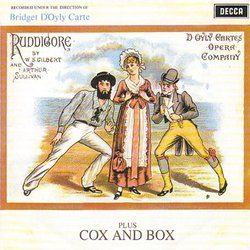| All Artists: Gilbert, Sullivan, Godfrey, D'Oyly Carte Opera Title: Ruddigore: Cox & Box Members Wishing: 0 Total Copies: 0 Label: Decca Import Release Date: 3/4/2003 Album Type: Import Genres: International Music, Jazz, Classical Styles: Europe, Continental Europe, Opera & Classical Vocal Number of Discs: 2 SwapaCD Credits: 2 UPC: 028947365624 |
Search - Gilbert, Sullivan, Godfrey :: Ruddigore: Cox & Box
 | Gilbert, Sullivan, Godfrey Ruddigore: Cox & Box Genres: International Music, Jazz, Classical |
Larger Image |
CD Details |
CD ReviewsFine Performance, Unfortunate Cuts Aronne | 09/13/2008 (5 out of 5 stars) "Ruddigore contains some of the most magical moments in the entire cannon of operas. This performance accentuates that.
Jean Allister, though she never performed with the D'Oyly Carte Opera Company outside of the recording studio, is an excellent Mad Margaret, making her "To a garden full of posies" a heart-wrenching experience. She and Kenneth Sandford as Sir Despard give a delightful "I once was a very abandon'd person" in Act 2. Annoyingly, a small squeak can be heard in the background during the third verse; but it is small and ignorable. If I had been organizing the cast, I would have switched Jean Hindmarsh and Mary Sansom. After all, Ms. Hindmarsh never played Rose Maybud on stage, Ms. Sansom did. Besides, Mary Sansom is one of my favorite G&S sopranos. She does excellently in the small role of Zorah, and Jean Hindmarsh does nothing wrong as Rose. I'm a sucker for Thomas Round's performances, and this is no exception. His Richard is everything it should be. Listen to his verse of "In sailing ov'r life's ocean wide" and you will see what I mean. He knows his part exquisitely. Donald Adams gives what is easily the best "When the night winds howl" ever. The worst thing about this recording (aside from its lack of dialogue) is the number of cuts. This is the edited D'Oyly Carte score rather than the original which was first performed in Sullivan's day. Nevertheless, the only omissions are the original finale, the second verse of "Happily coupled are we," and a small choral number sung by the bridesmaids. Cox and Box was originally issued on LP with the 1960/61 Gondoliers as a filler for the six record side. How fortunate we are to have had this happen! Donald Adams as Bouncer, Alan Styler as Cox, and Joseph Riordan as Box are all wonderful. They know their parts exceedingly well, making this recording a joy to listen to. All have incredible flexibility, reaching to the tops of their ranges without fault. Adams holds sustained E's, Styler G's, and Riordan B-flats. The only weakness of this recording is that this is the edited Savoy version of the opera, meaning the finale (a reprise), a number of repeats, and one other number are omitted (this number, the Gambling Duet, is normally omitted). A bit of the dialogue is cut down, but this ends up making the operetta more witty--a refined gem in a way. Overall, this set pairs two of the most wonderful recorded performances of the D'Oyly Carte during the 1960's and is definitely worth exploring. Ruddigore's music is unjustly neglected compared to The Mikado; Cox and Box shows Sullivan, the budding comic opera writer, at his best." |
